Reflections on the fierce & protective love of a hen vs the predatory nature of a fox … choosing the unexpected, challenging expectations along the Way … themes from Luke 13
Her love of her children definitely resembles my love of mine. – Alice Walker
Hen-Love
It is one of those moments that will be engraved on my brain forever. For I really saw her. She was small and gray, flecked with black; so were her chicks. She had a healthy red comb and quick, light-brown eyes. She was that proud, chunky chicken shape that makes one feel always that chickens, and hens especially, have personality and will. Her steps were neat and quick and authoritative; and though she never touched her chicks, it was obvious she was shepherding them along. She clucked impatiently when, our feet falling ever nearer, one of them, especially self-absorbed and perhaps hard-headed, ceased to respond.
— Alice Walker
Once you know how to come home to yourself, then you can open your home to other people, because you have something to offer. The other person has to do exactly the same thing if they are to have something to offer you.
— Thich Nhat Hanh
I have sharpened my knives, I have
Put on the heavy apron.
Maybe you think life is chicken soup, served
In blue willow-pattern bowls.
I have put on my boots and opened
The kitchen door and stepped out
Into the sunshine. I have crossed the lawn.
I have entered
The hen house.
— Mary Oliver, Farm Country
The Lifted Up One, the One who sits high and walks low, taught that the thoroughfare to God is full of bypaths and back roads.
The way up is down.
The way in is out.
The way first is last.
The way of success is service.
The way of attainment is relinquishment.
The way of strength is weakness.
The way of security is vulnberability.
The way of protection is forgiveness (even seventy times seven).
The way of life is the way of death — death to self, society, family.
Know your strengths. Why?
Because that’s the only way you can Lay Them Down.
God’s power is made perfect … where? In our weakness.
Want to get the most? Go to where the least is.
Want to be free? Give complete control to God.
Want to become great? Become least.
Want to discover yourself? Forget yourself.
Want honor? “Honor yourself with humility.”
Want to “get even” with enemies? Bless and love them.
— Leonard Sweet, Excerpt from Jesus Drives Me Crazy
On Hens
… drooping their wings for some to creep under, and receiving with joyous and affectionate clucks others that mount upon their backs or run up to them from every direction; and though they flee from dogs and snakes if they are frightened only for themselves, if their fright is for their children, they stand their ground and fight it out beyond their strength.” — Plutarch, 1st Century AD
… under the shadow of their wings, and with this covering they put up such a very fierce defense – striking fear into their opponent in the midst of a frightful clamor, using both wings and beak – they would rather die for their chicks than seek safety in flight.” — Ulisse Aldrovandi
The forest fire had been brought under control, and the group of firefighters were working back through the devastation making sure all the hot spots had been extinguished. As they marched across the blackened landscape between the wisps of smoke still rising from the smoldering remains, a large lump on the trail caught a firefighter’s eye. … As he got closer he noticed it was the charred remains of a large bird, that had burned nearly half way through. Since birds can so easily fly away from the approaching flames, the firefighter wondered what must have been wrong with this bird that it could not escape. Had it been sick or injured? … Arriving at the carcass, he decided to kick it off the trail with his boot. As soon as he did, however, he was startled half to death by a flurry of activity around his feet. Four little birds flailed in the dust and ash then scurried away down the hillside … The bulk of the mother’s body had covered them from the searing flames. Though the heat was enough to consume her, it allowed her babies to find safety underneath. In the face of the rising flames, she had stayed with her young. Her dead carcass and her fleeing chicks told the story well enough–she gave the ultimate sacrifice to save her young. — Jacqueline, DeepRoots blogger
A hen is to her little chicks, next, a cover of safety. There is a hawk in the sky; the mother bird can see it, though the chickens cannot; she gives her peculiar cluck of warn-ing, and quickly they come and hide beneath her wings. The hawk will not hurt them now; beneath her wings they are secure … for, in the next place, the hen is to her chicks the source of comfort. It is a cold night, and they would be frozen if they remained outside; but she calls them in, and when they are under her wings, they derive warmth from their mother’s breast. It is a wonder, the care of a hen for her little ones; she will sit so carefully, and keep her wings so widely spread, that they may all be housed. What a cabin, what a palace, it is for the young chicks to get there under the mother’s wings! The snow may fall, or the rain may come pelting down, but the wings of the hen protect the chicks; and you, dear friend, if you come to Christ, shall not only have safety, but comfort. I speak what I have experienced. … The hen is also to her chicks, the cherisher of growth. They would not develop if they were not taken care of; in their weakness they need to be cherished, that they may come to the fullness of their perfec-tion. — Charles Spurgeon
Why A Hen Instead of a Fox?
A hen is what Jesus chooses, which – if you think about it – is pretty typical of him. He is always turning things upside down, so that children and peasants wind up on top while kings and scholars land on the bottom. He is always wrecking our expectations of how things should turn out by giving prizes to losers and paying the last first. So of course he chooses a chicken, which is about as far from a fox as you can get. That way the options become very clear: you can live by licking your chops or you can die protecting the chicks. The image of God as hen is finally one that lays bare God’s vulnerability. When you are the mother hen, all you can do is open your wings wide and gather as many as you can. … Jesus won’t be king of the jungle in this or any other story. What he will be is a mother hen who stands between the chicks and those who mean to do them harm. She has no fangs, no claws, no rippling muscles. All she has is her willingness to shield her babies with her own body. If the fox wants them, he will have to kill her first … The fox slides up on her one night in the yard while all the babies are asleep. When her cry wakens them, they scatter. She dies the next day where both foxes and chickens can see her – wings spread, breast exposed – without a single chick beneath her feathers. It breaks her heart, but it does not change a thing. If you mean what you say, then this is how you stand. Which he does, as it turns out. — Barbara Brown Taylor
The Fox
… in Hebrew. Lions and foxes can be contrasted with each other to represent the difference between great men and inferior men. The great men are called “lions,” and the lesser men are called “foxes.” The epithet “fox” is sometimes applied to Torah scholars: “There are lions before you, and you ask foxes?”[4] In other words, “Why do you ask the opinion of foxes, that is, my opinion, when there are distinguished scholars present?” … Consider the following list of possibilities for “fox” in its negative sense: weakling, small-fry, usurper, poser, clown, insignificant person, cream puff, nobody, weasel, jackass, tin soldier, peon, hick, pompous pretender, jerk, upstart … In context, and referring to a local ruler, “fox” was a humiliating “slap in the face.” … Jesus was direct. Antipas was a שׁוּעָל בֶּן שׁוּעָל (shū‘āl ben shū‘āl, “a fox, the son of a fox”), a small-fry.— Randall Buth, Jerusalem Perspective
Hen Stories
The great Persian poet Rumi had an extraordinary teacher named Shams. Even as a child Shams seemed different. His own parents struggled with whether to send him to a monastery or the village of fools. They did not know what to do with him. When he had grown he told them the story of the duck’s egg that was found by the hen and hatched. The hen raised the duckling with her other chicks. One day they walked to a lake. The duck went right in the water, Shams said to his parents, “Now, father and mother, I have found my place. I have learned to swim in the ocean, even if you must remain on the shore.” — Jack KornfieldVariation on Fox and Hen in Aesop’s Fables — Milo Winter
One bright evening as the sun was sinking on a glorious world a wise old Cock flew into a tree to roost. Before he composed himself to rest, he flapped his wings three times and crowed loudly. But just as he was about to put his head under his wing, his beady eyes caught a flash of red and a glimpse of a long pointed nose, and there just below him stood Master Fox.
“Have you heard the wonderful news?” cried the Fox in a very joyful and excited manner.
“What news?” asked the Cock very calmly. But he had a queer, fluttery feeling inside him, for, you know, he was very much afraid of the Fox.
“Your family and mine and all other animals have agreed to forget their differences and live in peace and friendship from now on forever. Just think of it! I simply cannot wait to embrace you! Do come down, dear friend, and let us celebrate the joyful event.”
“How grand!” said the Cock. “I certainly am delighted at the news.” But he spoke in an absent way, and stretching up on tiptoes, seemed to be looking at something afar off.
“What is it you see?” asked the Fox a little anxiously.
“Why, it looks to me like a couple of Dogs coming this way. They must have heard the good news and—”
But the Fox did not wait to hear more. Off he started on a run.
“Wait,” cried the Cock. “Why do you run? The Dogs are friends of yours now!”
“Yes,” answered the Fox. “But they might not have heard the news. Besides, I have a very important errand that I had almost forgotten about.”
The Cock smiled as he buried his head in his feathers and went to sleep, for he had succeeded in outwitting a very crafty enemy.
The Hen is a Symbol of Motherhood for Reasons We May Have Forgotten, So Let Us Recall— Dr. Karen Davis
In our day, the hen has been degraded to an “egg machine.” In previous eras, she embodied the essence of motherhood. In the first century AD, the Roman historian Plutarch praised the many ways in which mother hens cherish and protect their chicks, “drooping their wings for some to creep under, and receiving with joyous and affectionate clucks others that mount upon their backs or run up to them from every direction; and though they flee from dogs and snakes if they are frightened only for themselves, if their fright is for their children, they stand their ground and fight it out beyond their strength.”
The Renaissance writer Ulisse Aldrovandi described how, at the first sign of a predator, mother hens will immediately gather their chicks “under the shadow of their wings, and with this covering they put up such a very fierce defense – striking fear into their opponent in the midst of a frightful clamor, using both wings and beak – they would rather die for their chicks than seek safety in flight.” Similarly, in collecting food, the mother hen allows her chicks to eat their fill before satisfying her own hunger. Thus, he said, mother hens present, in every way, “a noble example of love for their offspring.” … I saw this love in action, when a hen named Eva jumped our sanctuary fence on a spring day and disappeared, only to return three weeks later in June with eight fluffy chicks. Watching Eva with her tiny brood close behind her was like watching a family of wild birds whose dark and golden feathers blended perfectly with the woods and foliage they melted in and out of during the day. Periodically, Eva would squat down with her feathers puffed out, and her peeping chicks would all run under her wings for comfort and warmth. A few minutes later the family was on the move again … One day, a large dog wandered in front of the magnolia tree where Eva and her chicks were foraging. With her wings outspread and curved menacingly toward the dog, she rushed at him over and over, cackling loudly, all the while continuing to push her chicks behind herself with her wings. The dog stood stock still before the excited mother hen and soon ambled away, but Eva maintained her aggressive posture, her sharp, repetitive cackles and attentive lookout for several minutes after he was gone … Sitting on her nest, a mother hen carefully turns each of her eggs as often as thirty times a day, using her body, her feet, and her beak to move each egg precisely in order to maintain the proper temperature, moisture, ventilation, humidity, and position of the egg during the 3-week incubation period. Embryonic chicks respond to soothing sounds from the mother hen and to warning cries from the rooster. Two or three days before the chicks are ready to hatch, they start peeping to notify their mother and siblings that they are ready to emerge from their shells, and to draw her attention to any distress they’re experiencing such as cold or abnormal positioning … A communication network is established among the baby birds and between them and their mother, who must stay calm while all the peeping, sawing, and breaking of eggs goes on underneath her as she meanwhile picks off tiny pieces of shell that may be sticking to her chicks and slays any ants that may dart in to scavenge. During all this time, as Page Smith and Charles Daniel describe in The Chicken Book, “The chorus of peeps goes on virtually uninterrupted, the unborn chicks peeping away, the newborn ones singing their less muffled song.” … During the first four to eight weeks or so, the chicks stay close to their mother, gathering beneath her wings every night at dusk. Eventually, she flies up to her perch or a tree branch, indicating her sense that they, and she, are ready for independence … Let us with equal justice perceive chickens with envisioned eyes that pierce the veil of these birds’ “mechanization” and apprehend the truth of who they are. In The Chicken Book, Page Smith and Charles Daniel remind us, most poignantly: “As each chick emerges from its shell in the dark cave of feathers underneath its mother, it lies for a time like any newborn creature, exhausted, naked, and extremely vulnerable. And as the mother may be taken as the epitome of motherhood, so the newborn chick may be taken as an archetypal representative of babies of all species, human and animal alike, just brought into the world.” … This is What Wings Are For.
Reflections on being curious and asking questions … the experience of the holy season of Lent.
In the holy season of Lent, we are called to the spiritual discipline of preparation. Some part of this is the practice of curiosity and questioning. Entering Lent is wandering into the metaphorical ‘wilderness’ … where everything is primal and makes a difference and you’re likely to be at risk and to get lost … it’s about life and death, about getting down to core values. From that deep place arises the deep questions, the underlying ‘why’ that shapes how we live. So Lent is about living close to the wellspring of creativity and tension, beyond the context that usually makes us comfortable, safe, and secure. Paying attention to Lent becomes an invitation to go into an emotional, intellectual, physical and spiritual place where we have permission to wonder and doubt and explore and grow. — Rev Gail (with credit to Rev Sean Dunker-Bendigo of Madison Church for the inspiration to approach Lent as a series of questions)
Music Video Link: Question by the Moody Blues
Be present.
Make love. Make tea.
Avoid small talk. Embrace conversation.
Buy a plant, water it.
Make your bed. Make someone else’s bed.
Have a smart mouth and a quick wit.
Run. Make art. Create.
Swim in the ocean. Swim in the rain.
Take chances. Ask questions.
Make mistakes. Learn.
Know your worth.
Love fiercely. Forgive quickly.
Let go of what doesn’t make your happy.
Grow.
— Paulo Coelho
On Asking Questions: Being Curious
Always the beautiful answer / who asks a more beautiful question. —e.e. Cummings
Be curious. — Stephen Hawking
Don’t be afraid to look again at everything you’ve ever believed … I believe the more we search, the more we delve into the human teachings about the nature and God of life, which are in fact are the teachings of all the great religions traditions, the closer we come to a mature understanding of the Godself … In other words, doubt, questions, drive us to look at how we ourselves need to grow in wisdom, age and grace. The courage to face questions is the first step in that process. — Joan Chittister
Instead of anxiety about chasing a passion that you’re not even feeling, do something a lot simpler: Just follow your curiosity. — Elizabeth Gilbert
A good question is never answered. It is not a bolt to be tightened into place but a seed to be planted and to bear more seed toward the hope of greening the landscape of idea. — John Anthony Ciardi
Curiosity isn’t the icing on the cake. It’s the cake itself. — Susan Engel
We live in the world our questions create. — David Cooperrider
The role of the artist is to ask questions, not to answer them. — Anton Chekhov
I was looking for myself and asking everyone but myself questions which I, and only I, could answer. — Ralph Ellison
Ever since I was a little girl and could barely talk, the word ‘why’ has lived and grown along with me… When I got older, I noticed that not all questions can be asked and that many whys can never be answered. As a result, I tried to work things out for myself by mulling over my own questions. And I came to the important discovery that questions which you either can’t or shouldn’t ask in public, or questions which you can’t put into words, can easily be solved in your own head. So the word ‘why’ not only taught me to ask, but also to think. And thinking has never hurt anyone. On the contrary, it does us all a world of good. — Anne Frank
Judge a man by his questions, rather than his answers. — Voltaire
How do I create something out of nothing? How do I create my own life? I think it is by questioning. — Amy Tan
My mother made me a scientist without ever intending to. Every other Jewish mother in Brooklyn would ask her child after school, “So? Did you learn anything today?” But not my mother. “Izzy,” she would say, “did you ask a good question today?” That difference—asking good questions—made me become a scientist. — Isidor Isaac Rabi
On Lent: Surrendering Ourselves
The reality is that I cannot free myself from the bondage of self. I
cannot keep from being turned in on self. I cannot by my own
understanding or effort disentangle myself from my self interest and
when I think that I can …I am trying to do what is only God’s to do. To
me, there is actually great hope in admitting my mortality and
brokenness because then I finally lay aside my sin management program
and allow God to be God for me. Which is all any of us really need when
it comes down to it … — Nadia Bolz-Weber
… another Lenten season, a time of lengthening days…not just in hours
but in slowness, in taking time to linger over our spiritual lives, over
our identity as a people of faith, over the texts that form us and the
quiet places in which God speaks to us, still. — Kathryn M. Matthews
The big rub is that to surrender my “singularity” (John 12:24) and fall
into this “altogether new creation” will always feel like dying. How
could it not? It is a dying of the self that we thought we were, but it
is the only self that we knew until then. It will indeed be a
“revolution of the mind” (Ephesians 4:23). Heart and body will soon
follow. This is the real “try harder” that applies to Lent, and its
ultimate irony is that it is not a trying at all, but an ultimate
surrendering, dying, and foundational letting go. You will not do it
yourself, but it will be done unto you (Luke 1:38) by the events of your
life. Such deep allowing is the most humiliating, sacrificial, and
daily kind of trying! Pep talks seldom get you there, but the suffering
of life and love itself will always get you there. Lent is just
magnified and intensified life. — Richard Rohr
I think it is good news–because even if no one ever wants to go there,
and even if those of us who end up there want out again as soon as
possible, the wilderness is still one of the most reality-based,
spirit-filled, life-changing places a person can be … What did that
long, famishing stretch in the wilderness do to him? It freed him–from
all devilish attempts to distract him from his true purpose, from
hungry craving for things with no power to give him life, from any
illusion he might have had that God would make his choices for him. …
But it would be a mistake for me to try to describe your wilderness
exam. Only you can do that, because only you know what devils have your
number, and what kinds of bribes they use to get you to pick up. All I
know for sure is that a voluntary trip to the desert this Lent is a
great way to practice getting free of those devils for life–not only
because it is where you lose your appetite for things that cannot save
you, but also because it is where you learn to trust the Spirit that led
you there to lead you out again, ready to worship the Lord your God and
serve no other all the days of your life. — Barbara Brown Taylor
But the historic practices of Lent are Christian. There are three of
them: praying, fasting, almsgiving. These are three things that
Christians should consider doing all the time, but the 46 days of Lent
provide us with an explicit invitation to do them more intentionally. I
say an invitation, because we don’t have to do them, not during Lent,
not ever. … I am going to make an unabashed case for Lent, myself. …
Lent is a chance to uncork the bottle, to unclog our spirits from what
is stifling them, to sample the mystery. It is a chance to own that we
do not wholly own ourselves, but acknowledge that God has a claim over
us. We work so hard for radical equality in our lives—for equal
marriage, equal pay for equal work, an end to bigotry of all
varieties—and we sometimes delude ourselves, as religious people, that
radical equality extends to our relationship with God … Taking on a
Lenten discipline means surrendering to a higher power, it means placing
ourselves under God’s authority and protection. But here’s the rub: to
place ourselves under God’s authority is a reminder that we are under no
other authority, or at least that all those other authorities are less
than God’s. The church, the state, our remote fathers, our overbearing
mothers, our inept boss who gets paid more than we do, our snarky
coworkers, the popular crowd, the opposing football team, the opposing
political party, Al Qaeda, alcohol, fried foods, chocolate, caffeine,
porn, late-night cable. Whatever our addictions, whatever our
self-medication devices, whatever our overlords of fear and control,
none can match the power of God our Father and Mother, if we choose God
as our God. To claim that we are in a direct relationship with our
Creator, to join with that Creator and Sustainer in an act of
self-disciplining, is an act of resistance. It’s a boycott of all that
is body-wounding and soul-killing. It is a radical re-ordering of our
priorities, and a reclamation of our God-given will and strength … …
What might you do, this Lent, to rend your heart, to give God an
opening? What might you do to make God-shaped space within your heart, a
space that will invite you to call on the name of God more frequently,
to share the experience of your brother Jesus in the wilderness, to
uncork the Spirit and let it flow freely, to release yourself from rage
or addiction or the tyranny of lesser gods? What can you give up, or
take on, as an act of resistance against the authorities that don’t
deserve any claim over you? — Molly Phinney Baskette
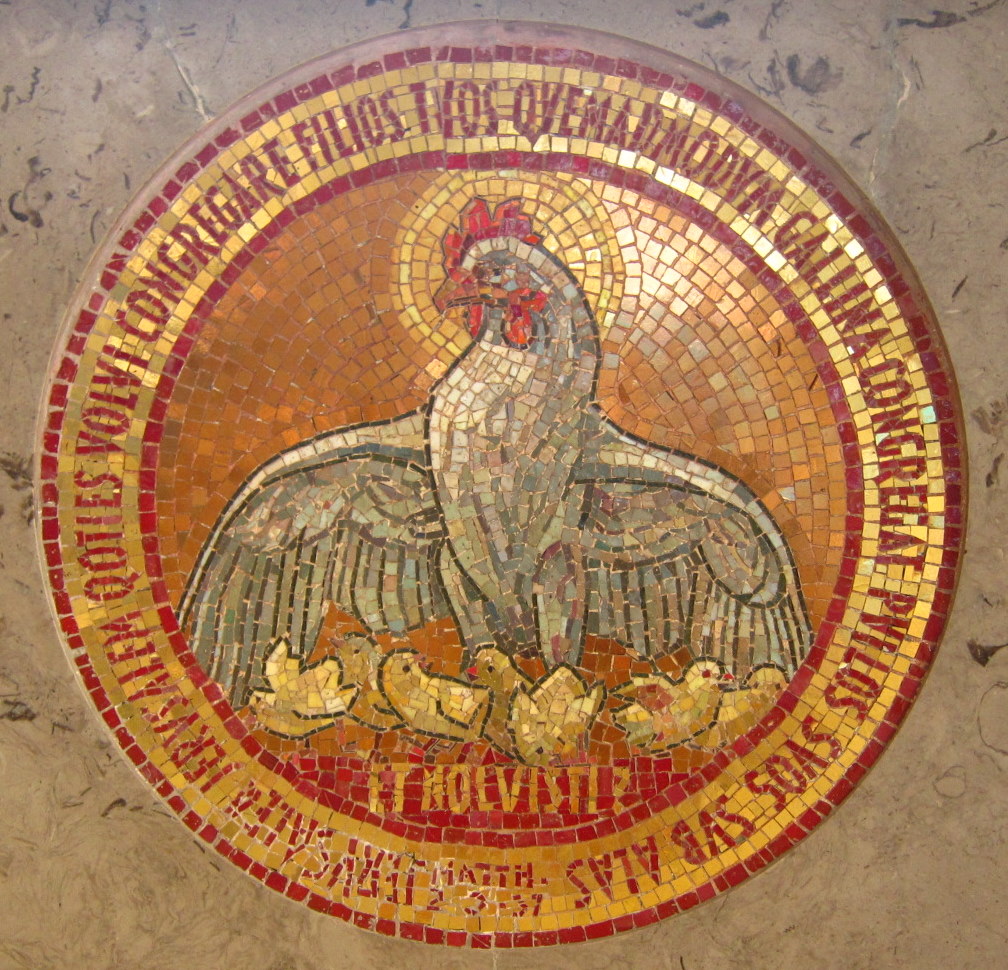

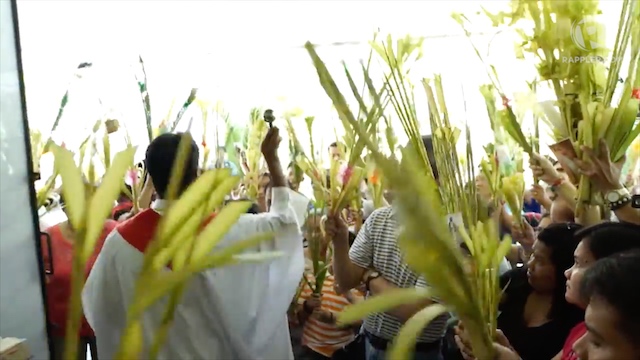
 SUN, MAR 25: Palm Sunday
SUN, MAR 25: Palm Sunday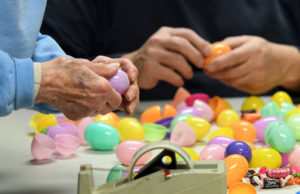
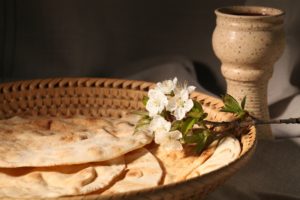
 THURS, Mar 29 – FRI, MAR 30: HOLY FRIDAY VIGIL
THURS, Mar 29 – FRI, MAR 30: HOLY FRIDAY VIGIL 1pm • Jackson Community Church
1pm • Jackson Community Church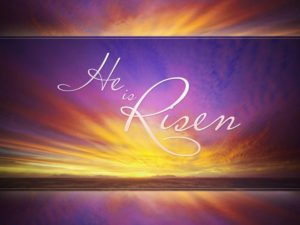 SUN, APR 1: EASTER
SUN, APR 1: EASTER